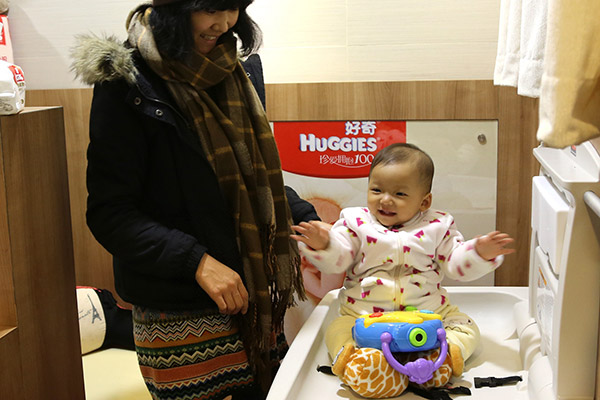
A mother tends to her baby in a nursing room at a shopping mall in Shanghai.[Photo/Xinhua]
All major public places in China, such as transportation hubs, big shopping malls and hospitals, should be equipped with mother-and-child facilities by the end of 2020, according to a top authority guideline to support the implementation of the universal two-child policy.
All major airports and train stations in provincial capitals in China should offer such facilities before the end of this year, and more than 80 percent of major public places in the country should be equipped with such services by the end of 2018, according to the guideline, released by the National Health and Family Planning Commission.
Such facilities, used for breast-feeding or diaper changing, should be at least 10 square meters with slip-proof floors, and include diaper-changing pads, hand-wash basins with hot water, cribs and chairs for mothers to sit in while breast-feeding, the guideline said. Workplaces should also set up nursing homes for breast-feeding staff, it added.
The commission called on other government departments, such as the Ministry of Transport and National Tourism Administration, for financial support and effective supervision to ensure the targets are achieved.
China adopted a universal two-child policy at the beginning of the year, which made 90 million more couples eligible to have a second child.
The number of babies born in the first half of the year reached 8.3 million, up 6.9 percent over the same period last year, and the number of births is expected to continue increasing over the next few years, according to the commission. However, mother-and-child facilities in many public places are absent or underequipped, often drawing criticism from the public.
Although the government has been encouraging companies to set up breast-feeding rooms, only 30 percent of companies in China with such facilities, according to a report by China Women’s News.
“Breast-feeding and attending babies involves privacy and can be embarrassing in public. All public places should be equipped with such facilities, if possible,” said Yuan Xin, a professor of population studies at Tianjin-based Nankai University. “The establishment of such facilities also reflects the development of a society.”
The National Health and Family Planning Commission will establish standards on such mother-and-baby facilities and encourage incorporating the establishment of such facilities into urban planning to address the lack of such facilities, Wang Guoqiang, vice-minister in charge of the commission, said in August at an event to promote breast-feeding in Beijing.
